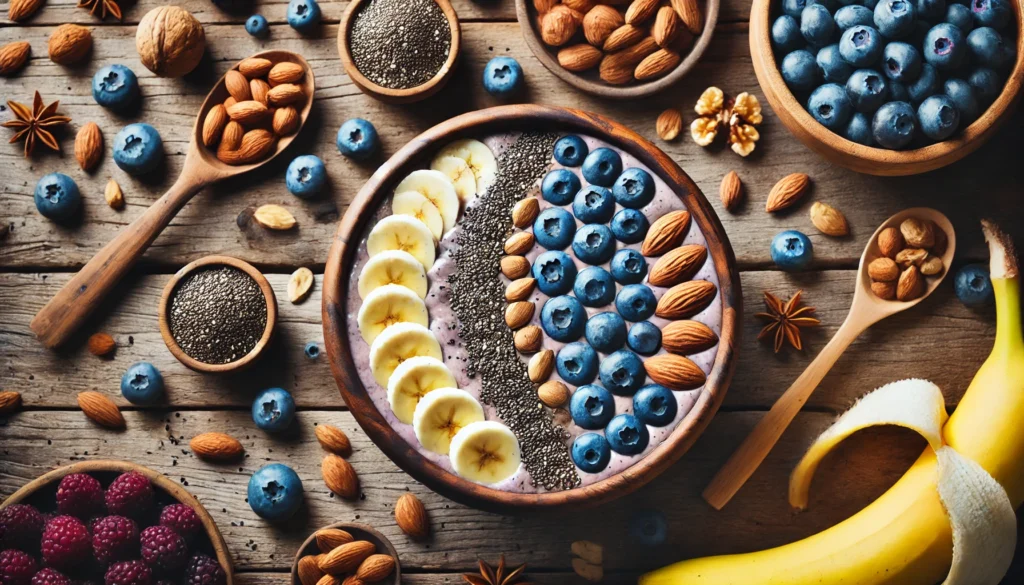In today’s fast-paced world, maintaining peak mental performance is paramount. Whether you’re a health and wellness coach, a science journalist, or a biohacker, the quest for mental clarity and productivity is universal. Fortunately, the foods we consume can significantly influence brain function, alertness, and overall cognitive health. This article delves into the fascinating world of brain-boosting foods, providing insights into how diet can enhance your mental acuity.
You may also like: Mindfulness Techniques to Improve Attention Span
The Science Behind Brain Food
Understanding how diet affects brain function requires a deep dive into the nutrients that fuel our neural networks. The brain, though only 2% of our body weight, consumes about 20% of our daily energy intake. This makes it crucial to provide it with high-quality fuel.
The Brain’s Energy Demands
The brain’s energy demands are enormous, necessitating a consistent supply of nutrients to function optimally. Glucose, the primary energy source for the brain, must be obtained from the diet. A steady supply of glucose helps maintain focus, alertness, and cognitive function throughout the day. Interruptions in this supply can lead to fatigue and mental fog.
The Role of Neurotransmitters
Neurotransmitters are chemical messengers that play a critical role in mood regulation and cognitive function. Amino acids from protein-rich foods are essential for the synthesis of neurotransmitters like serotonin and dopamine. These neurotransmitters influence mood, motivation, and concentration, highlighting the importance of a balanced diet.
The Impact of Inflammation on Brain Health
Chronic inflammation can negatively affect brain health, leading to cognitive decline. Antioxidants and anti-inflammatory compounds found in various foods combat inflammation and oxidative stress. This protective effect is crucial for preserving brain function and preventing age-related cognitive issues.
Key Nutrients for Cognitive Enhancement
The right nutrients can powerfully impact cognitive performance, memory, and mood. Let’s explore some of the essential nutrients that can enhance brain health.
Omega-3 Fatty Acids
Omega-3 Fatty Acids: Found in abundance in fatty fish like salmon and trout, omega-3s are vital for building brain cell membranes and promoting new neuronal connections. They are crucial for cognitive functions, impacting memory and mood regulation.
Omega-3 fatty acids are vital for maintaining the fluidity of cell membranes, which is essential for efficient neuronal communication. These fats also play a role in reducing inflammation in the brain, which can protect against conditions like depression. Moreover, omega-3s have been shown to support the development of the brain in infants and children, making them crucial across all life stages.
Antioxidants
Antioxidants: These powerful compounds, prevalent in berries such as blueberries and strawberries, help combat oxidative stress and inflammation, both of which can accelerate brain aging and cognitive decline.
Antioxidants neutralize free radicals, which can damage cells and lead to inflammation. By combating oxidative stress, antioxidants help maintain the integrity of brain cells. This protective role is particularly important for preventing neurodegenerative diseases. Studies have shown that diets rich in antioxidants are associated with improved memory and cognitive function.
B Vitamins
B Vitamins: Essential for energy production and the synthesis of neurotransmitters, B vitamins are found in leafy greens, eggs, and whole grains. They play a pivotal role in maintaining optimal brain health.
B vitamins are crucial for converting food into energy, which is vital for brain function. They are also involved in the production of serotonin, a neurotransmitter that influences mood. Deficiencies in B vitamins can lead to fatigue, depression, and cognitive decline, underscoring their importance in the diet.
Choline
Choline: This nutrient, present in eggs and soybeans, is a precursor for acetylcholine, a neurotransmitter involved in memory and learning.
Choline is a key nutrient for brain development and cognitive function. It supports the production of acetylcholine, which is essential for memory retention and learning. Adequate choline intake is linked to improved cognitive performance and a reduced risk of neurodegenerative diseases.

Polyphenols
Polyphenols: Found in dark chocolate, tea, and red wine, polyphenols support brain health by enhancing blood flow and protecting brain cells from damage.
Polyphenols are known for their ability to improve cerebral blood flow, which is crucial for delivering oxygen and nutrients to the brain. They also exhibit neuroprotective properties by reducing inflammation and oxidative damage. Regular consumption of polyphenol-rich foods is associated with improved memory and cognitive function.
Foods That Enhance Brain Function
Incorporating brain-boosting foods into your diet can lead to noticeable improvements in focus, concentration, and overall cognitive performance. Let’s explore some of these foods in detail.
Fatty Fish
Fatty fish, such as salmon, mackerel, and sardines, are rich sources of omega-3 fatty acids. These essential fats are integral to brain cell structure and signaling. Studies have linked higher omega-3 intake to reduced risks of cognitive decline and improved memory.
Including fatty fish in your diet at least twice a week can ensure an adequate intake of omega-3s. These fish not only provide cognitive benefits but also support heart health, which is crucial for maintaining overall well-being. For those who do not consume fish, omega-3 supplements derived from algae offer a plant-based alternative.
Berries
Berries, particularly blueberries, are packed with antioxidants known as flavonoids. These compounds have been shown to improve communication between brain cells, reduce inflammation, and enhance memory. Regular consumption of berries is associated with delayed brain aging and improved cognitive functions.
Berries are a versatile food that can be easily incorporated into meals and snacks. Whether added to smoothies, cereal, or yogurt, they provide a delicious way to boost antioxidant intake. Seasonal variations allow for a variety of berry options throughout the year, each offering unique health benefits.
Nuts and Seeds
Nuts and seeds, including walnuts, almonds, and flaxseeds, provide a combination of healthy fats, antioxidants, and vitamin E. Vitamin E is crucial for protecting cell membranes from oxidative stress, and research suggests that higher vitamin E intake is linked to better cognitive performance.
Nuts and seeds are convenient snacks that offer a concentrated source of nutrients. They can be consumed on their own or added to salads, oatmeal, and baked goods. Regular consumption of nuts and seeds has been linked to improved heart health, further supporting overall brain function.
Whole Grains
Whole grains like brown rice, oats, and quinoa provide glucose, the brain’s primary energy source. Unlike simple carbohydrates, whole grains offer a steady release of energy, keeping you mentally alert throughout the day.
Incorporating whole grains into meals provides sustained energy without the rapid blood sugar spikes associated with refined carbohydrates. This steady energy release supports concentration and reduces the likelihood of mid-day energy crashes. Whole grains also provide fiber, which supports digestive health.
Dark Chocolate
Dark chocolate, with a cocoa content of 70% or higher, is rich in flavonoids, caffeine, and antioxidants. Consuming dark chocolate is associated with improved mood, enhanced memory, and increased focus.
Moderation is key when consuming dark chocolate, as it is calorie-dense. A small piece can be a satisfying treat that offers cognitive benefits. Dark chocolate can be enjoyed on its own or used in baking for an antioxidant-rich dessert.
Snacks to Boost Your Focus
When the afternoon slump hits, reaching for brain-boosting snacks can help maintain your focus and productivity. Here are some snacks that provide both nourishment and a cognitive kick:

Trail Mix
Trail mix is a convenient and portable snack that combines nuts, seeds, and dried berries. Rich in omega-3s, antioxidants, and vitamins, it provides a balanced mix of nutrients. Creating your own trail mix allows you to customize it to your taste preferences, ensuring a healthy snack tailored to your needs.
Greek Yogurt with Berries
Greek yogurt paired with berries offers a combination of protein, probiotics, and flavonoids. The protein helps keep you full, while the probiotics support gut health, which is closely linked to brain function. This snack is quick to prepare and can be enjoyed at any time of the day.
Avocado Toast
Whole-grain bread topped with avocado provides a dose of healthy fats and fiber for sustained energy. Avocado is rich in monounsaturated fats, which support healthy blood flow to the brain. Adding toppings like sliced tomatoes or seeds can enhance the nutritional profile of this popular snack.
How Diet Affects Focus and Concentration
Diet plays a crucial role in regulating neurotransmitter production, blood sugar levels, and brain health, all of which influence focus and concentration. Here’s how:
Neurotransmitter Balance
Nutrients like amino acids and B vitamins contribute to the synthesis of neurotransmitters such as serotonin and dopamine, which are vital for mood regulation and focus.
Maintaining neurotransmitter balance is essential for optimal mental performance. A diet rich in proteins, complex carbohydrates, and healthy fats supports the production of these chemical messengers. Consuming foods high in tryptophan, such as turkey and nuts, can boost serotonin levels, promoting a sense of well-being.
Blood Sugar Stability
Consuming complex carbohydrates prevents rapid spikes and crashes in blood sugar levels, maintaining steady energy and focus.
Stable blood sugar levels are crucial for sustained cognitive function. Including fiber-rich foods like vegetables, legumes, and whole grains in your diet helps regulate blood sugar. This stability prevents the fatigue and irritability often associated with fluctuating blood sugar levels.
Brain Health
Antioxidants and healthy fats protect brain cells from damage and support the formation of new synaptic connections, enhancing cognitive abilities.
A diet rich in antioxidants from fruits and vegetables supports brain health by reducing oxidative stress. Healthy fats from sources like avocados, nuts, and olive oil provide the building blocks for brain cells. Together, these nutrients promote neuroplasticity, the brain’s ability to adapt and form new connections.
Future Implications and Trends
As research in neuroscience and nutrition advances, the link between diet and brain function continues to gain recognition. Future trends may include personalized nutrition plans based on genetic profiles to optimize brain health and the development of functional foods specifically designed to enhance cognitive performance.
Personalized Nutrition
Advancements in genetic testing are paving the way for personalized nutrition plans tailored to individual needs. By understanding genetic predispositions, dietitians can create customized plans that optimize brain health. This approach holds promise for preventing cognitive decline and enhancing mental performance.
Functional Foods
The development of functional foods designed to support cognitive function is on the rise. These foods are fortified with nutrients known to enhance brain health, such as omega-3s, antioxidants, and vitamins. As consumer interest in brain health grows, the market for these innovative products is expected to expand.
Integrative Approaches
Combining dietary strategies with lifestyle changes, such as exercise and mindfulness, can provide a holistic approach to improving cognitive function. This integrative approach recognizes the interplay between diet, physical activity, and mental health in promoting overall well-being.

Conclusion
Incorporating brain-boosting foods into your daily diet is a practical and effective way to enhance your cognitive functions, improve focus, and boost productivity. By choosing foods rich in omega-3s, antioxidants, and essential nutrients, you can support your brain health and empower yourself to tackle daily challenges with clarity and vigor. Whether you’re crafting a diet plan for clients, writing an engaging article, or seeking to optimize your mental performance, these insights into brain food can serve as a valuable resource.
By understanding the science behind brain-boosting foods and implementing dietary strategies, you can take proactive steps to support your mental well-being. As research continues to uncover the intricate relationship between diet and brain function, staying informed about the latest trends and findings will enable you to make informed choices for your health and productivity.
Further Reading:
The best (and worst) foods to eat for focus
10 foods to boost your brainpower
Important Note: The information contained in this article is for general informational purposes only, and should not be construed as health or medical advice, nor is it intended to diagnose, prevent, treat, or cure any disease or health condition. Before embarking on any diet, fitness regimen, or program of nutritional supplementation, it is advisable to consult your healthcare professional in order to determine its safety and probable efficacy in terms of your individual state of health.
Regarding Nutritional Supplements Or Other Non-Prescription Health Products: If any nutritional supplements or other non-prescription health products are mentioned in the foregoing article, any claims or statements made about them have not been evaluated by the U.S. Food and Drug Administration, and such nutritional supplements or other health products are not intended to diagnose, treat, cure, or prevent any disease.


